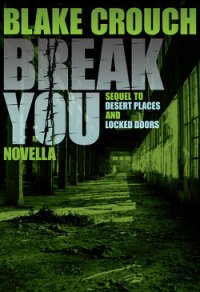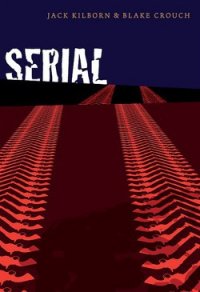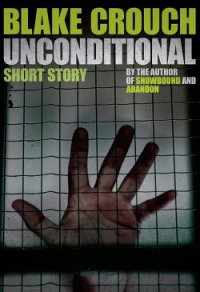Locked Doors - Crouch Blake (книги серия книги читать бесплатно полностью txt) 📗
“The reason I say vacation,” he continued, “you know is just cause I notice you have a suitcase out over on the uh, the thing over there.”
“Yes, I’m going away for a little while.”
“Well, okay, then I’ll uh, I’ll tell Julie.”
He couldn’t help himself. For the third time he looked at the article.
“Why don’t you take it with you?” I said. “I’m finished with it. Crazy stuff, huh?”
“Yeah. It’s…wow. Well, look, I’ll uh, I’ll let Julie know.” He picked up the article, then said, “I’m very sorry to bother you.”
As Horace walked by and opened the front door, I realized how paranoid I’d become. He stepped out into the afternoon darkness and I lingered in the doorway, watching him climb into a Land Cruiser and head back up the driveway. The noise of its engine soon faded into woodland silence and there was nothing but the whisper of wind in the firs.
I walked back inside to finish packing, my thoughts returning to how I would find Luther Kite in this wide wide world.
Driving home through the cold Yukon darkness, Horace Boone could hardly contain his joy. Having read Andrew Thomas’s manuscript, Desert Places, he understood perfectly well what was happening: on the supposition that Andrew was telling the truth, Luther Kite had survived the desert, was now alive and wreaking havoc, and Andrew was going to find him. Though it would devour all his savings, Horace would follow.
This was as much of a story as any writer could dream of.
I lay awake in bed, the sleepless hours ticking away. My suitcase was already packed in the Jeep and when I woke in the morning I had only to walk outside, climb behind the wheel, and drive away. Whitehorse, Yukon was 158 kilometers to the east. There I’d catch a flight to Vancouver and from Vancouver, on to America. In a storage locker in Lander, Wyoming, there were things that might help me find Luther Kite—my brother’s journals containing poetry, photographs, even a record of his and Luther’s activities. I’d put it all in storage after fleeing Orson’s cabin seven years ago because some of it incriminated me.
Now something was needling me about Luther and how I would find him. It seemed I’d read somewhere in Orson’s journals that he’d grown up on an island.
There was a cracking in the distance. I knew this sound.
My first autumn in the Yukon I woke in bed one night petrified by a mysterious cracking in the forest. Unable to fall back asleep, I dressed and crept through the trees, arriving at last at a frozen pond where a bull moose was stamping his hooves into the ice. I’d watched him finally break through and dip his muzzle into the frigid water for a drink.
Hearing that sound again, I imagined it to be a goodbye of sorts and it threatened to unglue me. But I wouldn’t cry anymore tonight. I’d loosed all the tears I was going to shed and now existed in a state of shock—shock that I was willingly leaving my harbor to sail back into madness. It was the uncertainty that haunted me, mostly for Beth Lancing, selfishly for myself—as I lie in bed watching fireshadows dance along the rafters of my precious home, I couldn’t purge the thought that I would never see this place again.
25
EARLY Friday morning Vi pulled into the driveway of her new home and turned off the car. The far left window on the facade of her house glowed and through half-drawn blinds she saw her husband rising out of bed. She climbed out, shut the door, sat down on the back bumper of the Cherokee. She glanced at her watch. It was one minute before five which meant she’d been awake now for forty-six hours.
Dawn was imminent. She gazed out across the treeless subdivision, hushed and still. The drone of the interstate reached her from beyond the field, a quarter mile distant, hidden behind a sliver of pines. There was never a moment in Arcadia Acres when the interstate fell silent. But she loved its transient undertone, found comfort in it. And she relished the ordinariness of this neighborhood. When Vi looked down Briar Lane she didn’t see a street of soulless homogeneous starter homes. She saw herself and Max earning an honest living. Because Vi wasn’t raised on entitlement she aspired to simple things—a family, comfortable home, occasional vacations to Gatlinburg and Myrtle Beach, finding an identity in her community, her church, her precinct.
In the cold misty silence of Arcadia Acres she meditated on the blessings in her life. After the crime scene she’d just processed she needed this stabilizing solace.
On the way to the front door she gathered up the broken necks of Ben and Hank Worthington, the evisceration of their parents, the shock of Jenna Lancing, and shoved it all into an insensate alcove she’d been conditioning in the back of her mind. This was the hardest part—walking into a warm peaceful home after thirty-five hours in hell. It was unbearable to Vi that such disparities could exist and she wondered, Which is the illusion?
Her husband was standing in the foyer in his briefs when she stepped inside. The aroma of newly ground coffee beans engulfed her and as the front door closed Max came forward, arms opening for an embrace. But Vi put her hand on his chest and shook her head.
“It’s all over the news,” he said.
She walked past him and turned left into the hallway, still lined with unopened boxes.
“Don’t you wanna talk, sweetpie?” he called after her.
When she reached their bedroom she set her purse on the dresser and sat down on the edge of the giant waterbed, only slightly smaller than the dimensions of the bedroom.
Her eyes closed. She could’ve fallen asleep sitting up.
When she opened them Max was kneeling beneath her. He slipped off her heels, massaged her feet. Then he unbuttoned her lavender jacket, grabbed it by the cuffs, and said, “Hold your arms out.” Vi closed her eyes, held out her arms. Max tossed her jacket into the corner and while he undid the buttons on her blouse she drifted off. He told her to hold her arms out again, then to stand up. Max unzipped and unclipped her skirt. It dropped to the floor. He worked her hose down her legs and pulled them off her small feet. From his shirt drawer Max took a soft gray Mooresville Cross-Country T-shirt. Then he unhooked his wife’s bra and slung it across the room onto the accumulating heap of clothes.
“Arms up.”
He slipped the T-shirt over her head. Then he turned back the comforter and helped guide her legs underneath the covers. Two days without shaving had turned them imperceptibly rough like ultra fine grit sandpaper.
“Thirsty, angel? Need anything?”
“No,” she whispered, nearly gone.
“Why won’t you talk to me?”
“Cause I’m so tired I can’t even think, Max. Stop it.”
Max sat on the edge of the bed and stroked her hair while she fell asleep.
When Vi awoke it was dark again. Her eyes focused on the wooden cross hanging on the wall beside the doorway. It was the only adornment they’d put up since moving into the house last week. Her father had carved it from an oak branch and presented it to her three Christmases ago.
She heard Max in the kitchen. Pots clanged and the sweet warmth of baking bread flowed into the bedroom from the hallway.
Vi climbed out of bed and walked into the tiny adjoining bathroom. She stripped her shirt and panties and started the shower. She sat down in the bathtub, letting the water rain down upon her head and diverge into hot rivulets that descended the contours of her body.
Mindlessly she watched the water swirl into the drain and she did not rise until the shower had begun to cool.




